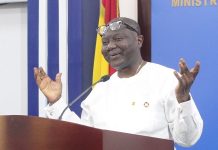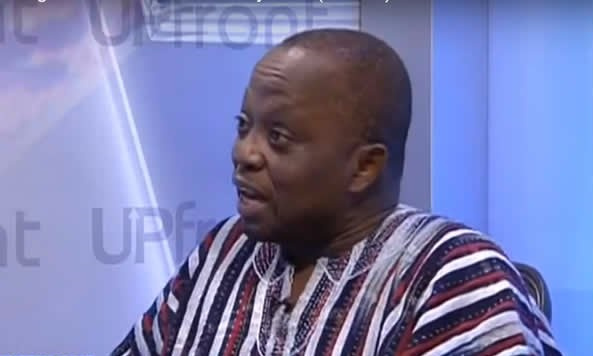The report of the Auditor-General on Special Audits carried out on
selected state institutions in the year 2018 has uncovered several
infractions at the Electoral Commission (EC) running into hundreds
millions of cedis.
The infractions, which mainly took place between 2014 and 2016, involves expenses related to the 2016 general elections.
The Auditor-General has directed the commission to recover the monies or
it will disallow the expenditure, and the authorising and approving
officers shall be surcharged.
GH¢371m transferred without authorisation of the chairperson
A total of GH¢371 million (GH¢371,099,137) was transferred from the
commission’s Ghana Integrated Financial Management Information System
(GIFMIS) Sub-Consolidated Accounts into the commission’s operations
accounts for electoral activities without the authorisation of the
chairperson.
GH¢100m budget overrun capital expenditure
A review of the commission’s budget for 2016 indicates that Parliament
approved a total amount of GH¢10.8 million (GH¢10,849,097) for capital
expenditure.
The commission, however, expended a total amount of GH¢110.9 million
(GH¢110,947,849.29) on Non-Current Assets (CAPEX), resulting in budget
overrun totalling GH¢100 million (GH¢100,098,752.29), representing 923%
more than the approved budget.
$6.8m unjustified excess expenditure on 100 district offices
The EC constructed 100 district offices, as well as engaged consultants at a cost of $7,500,000 and $750,000.
The Commission requested to use restricted tendering, and it was
approved by the Public Procurement Authority (PPA) at a cost $8,250,000.
However, the commission awarded the contract for $15.1 million ($15,127,362.53).
This resulted in an unjustified excess expenditure of $6.8 million ($6,877,362.53).
GH¢4.1m spent on new head office that has not been occupied
The commission paid a total amount of GH¢4.1 million (GH¢4,185,688.08),
including the cost of consultancy for partitioning and fitting-out the
new head office, as against the budgeted amount of GH¢700,000.
The Auditor General charged management to provide correspondence on the
approval of the excess funds from the Minister of Finance or face
sanctions.
GH¢10.4bn tax was not paid to GRA
Contrary to the income tax laws, the commission did not withhold tax at
the rate of 20% on allowances paid for electoral activities, resulting
in a tax liability of GH¢10.4 billion (GH¢10,424,460).
Management explained that the practice has been that allowances to
polling and field operation officials are not subjected to tax.
But the Auditor-General charged management to seek retrospective waiver
from Parliament, failing which the commission should pay the amount of
GH¢10.4 billion to the Commissioner-General of the Ghana Revenue
Authority by December 31, 2018, and could subsequently recover the
amount from the payees as prescribed by law.
The Auditor-General warned that it would institute surcharge proceedings
against the management team if their recommendations are not heeded to.
Contract awarded in foreign currency
Contrary to government directives, the commission awarded various
contracts, totalling $60.3 million ($60,304,736.53), in foreign currency
during the period under review without clearance from the Ministry of
Finance.
GH¢248,101.67 VAT/NHIL paid without invoices
Four suppliers added a total of GH¢248,101.67 as Value Added Tax (VAT)
and National Health Insurance Levy (NHIL) to the cost of goods and
services supplied to the commission but failed to issue VAT invoices to
account for the VAT/NHIL charged.
The Auditor-General ordered the commission to obtain the VAT invoices
covering the total amount of GH¢248,101.67 from the suppliers within 30
days from the receipt of the management letter, failing which the VAT
portion of the payment shall be disallowed, and the authorising and
approving officers shall be surcharged with the amount involved.
Twenty vendors the commission dealt with supplied goods and services
totalling $36.8 million ($36,857,701.50) and GH?89 million
(GH?89,085,085.35) without the statutory charges such as import duties
and VAT/NHIL.
The inability of the commission to inform GRA of their challenges in
obtaining parliamentary approval resulted in the loss of VAT/NHIL
revenue totalling $6.4 million ($6,450,097.76) and GH¢15.5 million
(GH¢15,589,889.94) and uncalculated import duty to the state.
The Auditor-General directed the commission to seek retrospective
approval from Parliament as early as possible or recover the amount from
the suppliers, failing which the approving and authorising officers
shall be surcharged with the amount.
The Auditor-General reviewed 40 contracts awarded by the commission,
and noted that 30 of them exceeded the Entity Tender Committee’s
threshold as spelt out in the second schedule of the Public Procurement
(Amendment) Act, 2016. However, there were no correspondence or approval
from the Central Tender Review Committee (CTRC) to indicate that these
contracts were reviewed or approved by them.
390 vehicles not insured
A total of 390 vehicles belonging to the commission and located in all
the 10 regions have not been insured, and the Auditor-General ordered
the commission to insure the vehicles within 30 days after the receipt
of the management letter and inform the Auditor General’s Department
for verification, failing which Section 3 (2) of the Motor Vehicle
(Third Party Insurance Act) Act 1958 shall be enforced.
The commission did not maintain an Asset Register and Inventory Register
to allow for monitoring, control and custody of the assets.
82 unserviceable vehicles not disposed
There was no Board of Survey to dispose of 82 vehicles that have become
unserviceable and parked in the regional offices, thus exposing them to
the vagaries of the weather, and thereby facilitating their
deterioration.











































